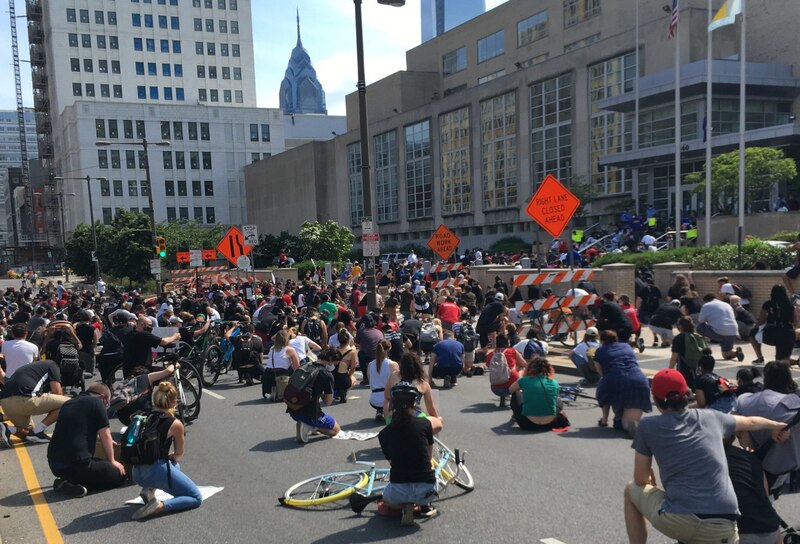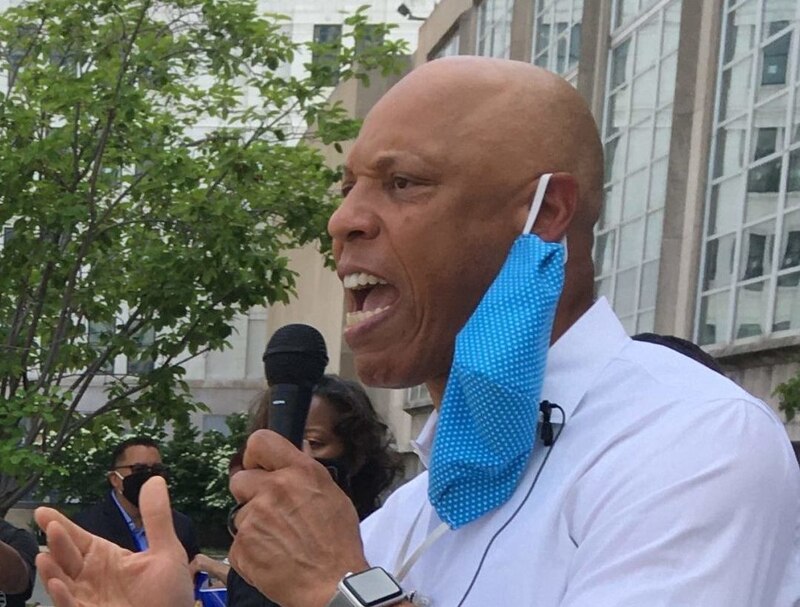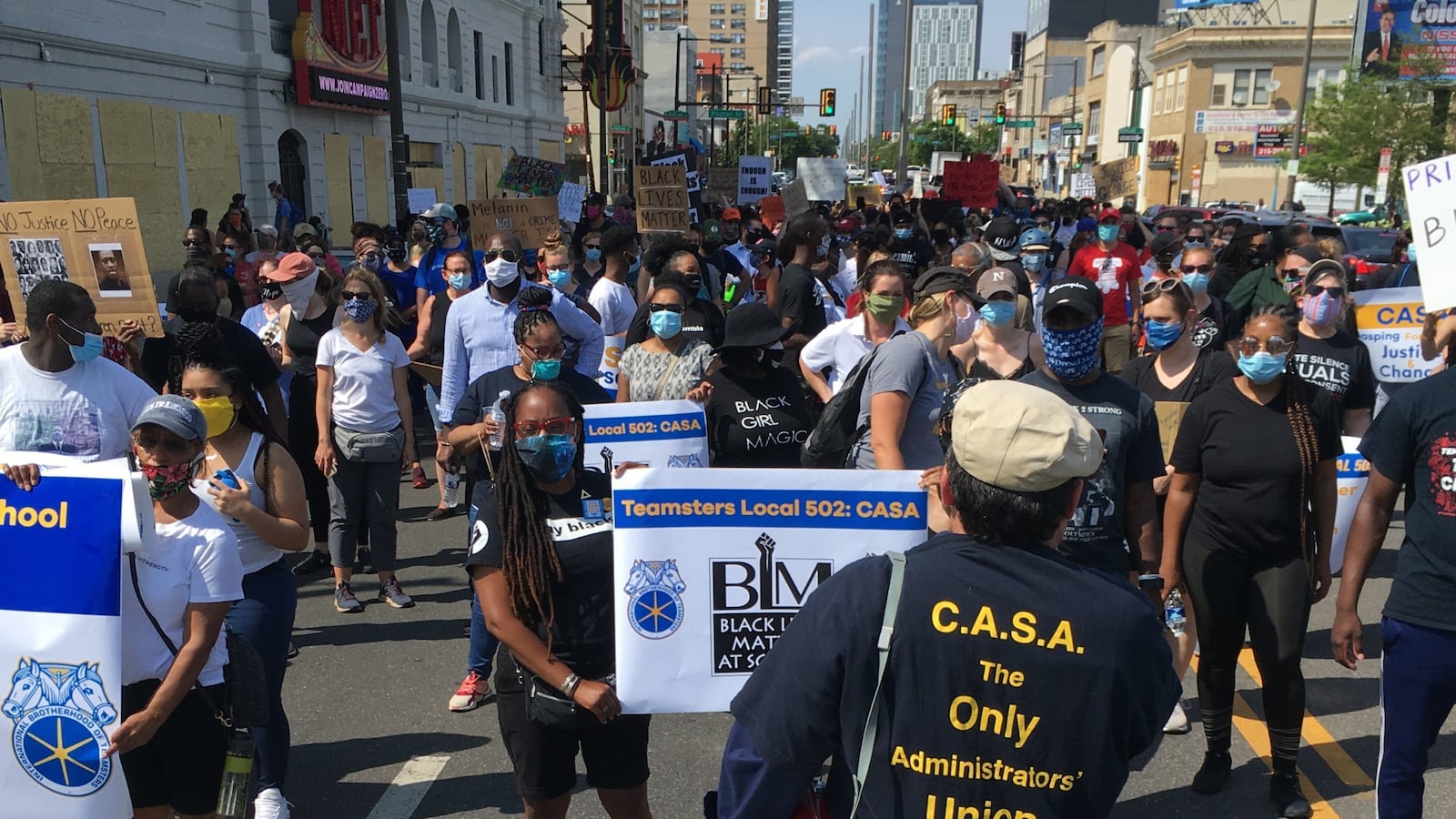This article was originally published in The Notebook. In August 2020, The Notebook became Chalkbeat Philadelphia.
If you’ve ever wanted to see Bill Hite get fired up, the place to be on Thursday afternoon was outside 440 N. Broad St.
“This is the year 2020!” the Philadelphia school superintendent roared to the crowd in the final minutes of a rally held in memory of George Floyd, who was killed by police in Minneapolis. The event was organized by Teamsters Local 502: CASA, the District’s principals’ union.
“I was born in the 1960s, in the segregated South. In a segregated city. Attended segregated schools. And now to think that once again, we’re having this conversation, because we all got to witness, in person, a black man like myself be stomped out because of the color of his skin?” Hite said.
As he spoke, hundreds of educators and public school supporters listened and cheered. An hour before, the group had marched silently down North Broad Street from the offices of the principals’ union to School District headquarters. There, they kneeled in silence for 8 minutes and 46 seconds in Floyd’s memory – the amount of time a Minneapolis police officer pressed his knee into Floyd’s neck, killing him. Then they stood to listen to a string of speakers urging them to renew the fight against racial injustice, in and out of the classroom.
“The knee of institutional racism is on us,” said Jerry Jordan, president of the Philadelphia Federation of Teachers.
“We want families and children to know that we stand with them,” said Robin Cooper, the CASA president who organized the educators’ protest.
“Black lives matter. All lives matter. It doesn’t matter what we look like, we are all educators. If no one else can do it, we can,” said Penny Nixon, superintendent of schools at Universal Charters.

Protesters kneel for 8 minutes, 46 seconds in memory of George Floyd. (Photo: Bill Hangley Jr.)
Hite was one of the last people to speak, opening a rare window into his own experience and the passions that drive him.
“Stand up against racism, any time we see it in our schools,” he cried. “Institutionalized racism is when the Philadelphia school system doesn’t get the funding it needs. … We can’t stand that anymore!”
Hite finished, saying: “And as I indicated before, no justice …”
“… no peace!” the crowd shouted back.
Later, Hite acknowledged that this sort of performance isn’t his typical style. Measured and deliberate in public, Hite rarely indulges in charged oratory. But Thursday, faced with a crowd infused with passion and urgency, Hite responded.
“You saw a side of me that I normally don’t [show],” Hite said later. “But I was fired up. This stuff weighs on me.”
The “stuff” in question goes beyond the death of Floyd. After the rally, Hite expanded on his personal history, sharing his experience growing up as an African American boy right in the capital of the old Confederacy. The death of George Floyd moved him deeply, Hite said, and raised the ghosts of injustices past – from recent deaths like Breonna Taylor’s and, in 2016, Philando Castile’s, to the assassinations of Martin Luther King Jr. and John F. Kennedy when he was a boy.
“It just brings back things,” said Hite. “I was pissed like hell when I saw the video. And when I saw what happened to the city as a result [i.e. the looting], I was mad – but I understand. It’s a powder keg, and this powder keg has blown. It’s blown with me.”
Changes ahead
Hite has some changes in mind, including bias training for staff, a “culturally competent” curriculum, and possibly a new office focused on diversity and equity. He recently shared new guidance for teachers to help their students deal with Floyd’s death and the subsequent disruption. A survey for parents about the District’s priorities for September will be released soon.
But so far, Hite’s leadership has not been all that some would like it to be. He’s taken heat for what some considered a tepid initial response to Floyd’s death.
“We were hoping you would encourage your educators, and show an example of how we might move forward,” tweeted Parents United for Education in response to Hite’s first statement. “Instead … you gave us a passive voice reference to ‘the death of George Floyd’ with no acknowledgment that he was killed (murdered) by police. You went with ‘violence isn’t the way’ without acknowledging that the violence in question originated from those in power.”
Since then, Hite has tried to sharpen his response, but some still want more. At Thursday’s rally, retired principal Cindy Farlino, now an assistant to CASA’s president, praised Hite’s speech, but said she hoped he’d take a firmer hand in guiding school communities toward more just practices.
“His speech was very good,” Farlino said. “He has some personal stories, and he should be leading this, not the [principals’ union]. Our teachers and our school leaders need leadership. People feel like they’re on their own, trying to meet with their staff and understand strategies.”
Hite said later that he’s prepared for that challenge, and he understands that a shift of sorts is afoot. During his dozen years as superintendent, in Philadelphia and Prince George’s County, Maryland, his biggest priorities have been boosting test scores, correcting academic inequities, and balancing the budget. Adding a complex social-justice mission while simultaneously meeting the demands of a pandemic represents a major expansion of his responsibilities.
But the demands of the moment are clear, Hite said: Justice for Philadelphia students requires more than solid academics and sound finances. It requires teachers and staff to effectively grapple with the most sensitive social questions – the kind that his own family is asking.
“I have an 8-year-old grandson who’s a black boy,” Hite said. “And he’s asking questions about, ‘Why didn’t the [officer] get off of him?’ And I’m trying my best to make sure that he understands that people do bad things and the reason some people do bad things. … Seeing him try to comprehend it, it’s tough.”

Superintendent William Hite addresses the crowd during an educators protest march on Thursday against the killing of George Floyd.
Growing up in black and white
As a boy, Hite lived in a world where racial inequity was pervasive, profound, and seemingly permanent.
“I grew up in Richmond, Virginia. The capital of the Confederacy,” he said. “There were two high schools where all the blacks went. … It’s not until we moved out of the city to a suburb of Richmond that I even had classes with white kids.”
Richmond had plenty of white schools, but for Hite, they may as well not have existed.
“You didn’t even ask the question about these other schools,” he said. “I came up through a system that said, you live on this side of town, you go here, and you live on that side, you go there.”
Hite didn’t know how good white kids could have it until he was a high school junior and his family moved to a more diverse suburb.
“I was like, oh shit! There’s computers, there’s instruments you can take home, there’s uniforms you don’t have to take home and wash yourself, you don’t have to buy your own helmet,” said Hite, who went on to play football at Virginia Tech University.
He has never forgotten the jolt he got when he changed schools.
“Through my whole educational career, that’s all I think about,” he said. “And I’ve been trying to do it from an educational side – literacy, numeracy.”
But what 2020 is revealing vividly is that reading and math skills aren’t enough. The deaths of George Floyd and other African American men and women at the hands of police show that justice means confronting a system that treats white people one way and black people another, Hite said.
“This foolishness is nuts,” he said. “If there’s ever been a chance for us to systematically change a justice system that is inherently unjust, this is that time. We have to take advantage of it. We can’t allow, like every other time, that this will just go away.”
But the challenge is steep, he said. Not every educator is ready to talk about social and racial justice with adults, much less students. He hopes his guidance – which “literally starts with getting everybody to do a deep-breathing exercise,” he said – will help. “People don’t want to be offensive, or be offended. And we have to acknowledge what they need in order to talk through this.”
Hite knows that not everyone is satisfied with his approach so far. Some, like Ismael Jimenez of the Melanated Educators Collective, a group of city educators dedicated to empowering teachers of color, wants to see the District move social justice to the very top of its academic agenda.
“Anti-racist education and orientation is the only thing teachers should be focused on professionally right now,” Jimenez said recently. “We are in a historic moment that can go several ways. … If teachers are not discussing and learning about the context of police brutality, they are complicit.”
Hite understands and respects that opinion. But he also knows that the District includes staff, students, and families coming from many different social and cultural perspectives. Not everybody is ready to dive into a conversation about race, he said, and everyone who does has to be ready for surprises.
Preparing staff could take time, Hite has said. In an earlier press call with reporters, Hite was asked whether it was possible that school would start earlier than its scheduled Aug. 31 opening, as may happen in some other Pennsylvania districts. He said it was more likely to start later.
“We may need more time,” he said, not just to prepare buildings and post-pandemic cleaning and hygiene policies, but to work with teachers on dealing with the impact of trauma and racism.
Hite said he recently heard from a mother whose elementary-age son found himself in a difficult spot during a Zoom class.
“The teacher asked them about their feelings, and the child said something about, he feels sorry for the police,” Hite recounted. The class piled on and the boy was hurt, Hite said, and resolving that pain won’t be easy.
“I have to think about multiple groups of people,” he said. Any plan for handling racial issues has to have room for “that child’s voice as well.”
Hite said that it was right after that call that he sat down to write his guidance for teachers. He knows that it won’t be easy to handle America’s most volatile social issue in classrooms. The brutal facts of Floyd’s death make it almost impossible to deny that institutional racism exists. But people can still find ways to deny it, and when one of them is President Trump, Hite said, that makes the District’s job harder.
Trump “can do a lot of damage convincing people that the problem is not real, while also pouring gasoline on their emotions,” he said. “What we need are ways for people to have these conversations about race. What we need to do is confront individuals who don’t believe in our children. … That’s the discourse we have to have. We’re all going to have the collective courage to confront that when we see it and say ‘hey, that ain’t cool.’”


